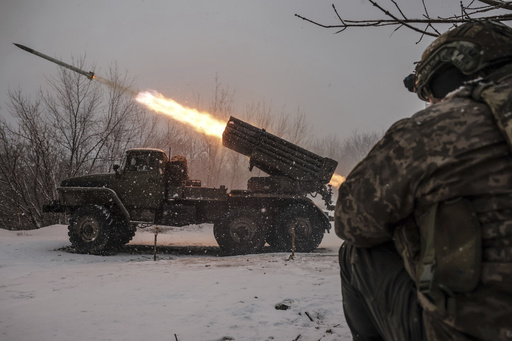Senior diplomats from both the United States and Russia are set to engage in discussions aimed at improving bilateral relations and negotiating an end to the ongoing war in Ukraine. This meeting, scheduled for Tuesday in Saudi Arabia, represents the most significant dialogue between the two nations since Russia launched its full-scale invasion almost three years ago. The talks highlight a shift in the U.S. administration’s policy, moving away from isolating Russia and paving the way for a possible encounter between President Donald Trump and President Vladimir Putin.
The recent surge in U.S. diplomacy surrounding the Ukraine conflict has raised alarms in Kyiv and among its allies, who are now eager to ensure their interests are represented in any potential agreement. In response to these developments, France saw the need to convene an emergency meeting among European Union nations and the United Kingdom on Monday to formulate their strategy.
Russian Foreign Minister Sergey Lavrov, along with Putin’s advisor Yuri Ushakov, arrived in Saudi Arabia on Monday, as reported by Russian state television. Ushakov stated that the talks would strictly follow a bilateral format without the involvement of Ukrainian officials. He emphasized the need for a serious approach from both sides to initiate a process of normalization in U.S.-Russian relations.
Leading the U.S. contingent will be Secretary of State Marco Rubio, national security adviser Mike Waltz, and Special Envoy Steve Witkoff, as confirmed by State Department spokesperson Tammy Bruce. Kremlin spokesman Dmitry Peskov clarified that the discussions will focus on rejuvenating various aspects of U.S.-Russian relations and laying the groundwork for potential peace talks regarding Ukraine, as well as organizing a summit between the two presidents. Bruce expressed that the objective of the meeting is to ascertain Russia’s genuine commitment to peace and whether substantive negotiations can commence.
In statements made to the media, Bruce reinforced that while Ukraine would not participate in the talks, any legitimate peace negotiations would necessitate Ukrainian involvement—a principle that had been foundational to U.S. policy under the previous administration led by Joe Biden.
In an interview on Fox News, Witkoff noted that he and Waltz would be conducting meetings as directed by the president and expressed hope for significant progress in addressing the Russia-Ukraine situation. He avoided commenting on whether Ukraine would need to concede substantial territory in any settlement. Meanwhile, U.S. Defense Secretary Pete Hegseth remarked that NATO membership for Ukraine seemed unrealistic, urging Kyiv to let go of the notion of reclaiming all lost territories—demands that align with Putin’s objectives.
This meeting signals a notable expansion of U.S.-Russian dialogue amidst a conflict that has strained relations to unprecedented lows. Previous brief interactions between Lavrov and ex-Secretary of State Antony Blinken at a G-20 meeting in India had failed to ease tensions, which only grew in following months, highlighted by concerns during a meeting of intelligence leaders in Turkey regarding potential nuclear escalation by Russia.
The upcoming discussions come in the wake of a recent phone call between Trump and Putin, during which they reportedly agreed to initiate negotiations immediately. This marked a departure from years of U.S. policy promoting Russia’s isolation in response to its incursion into Ukraine beginning on February 24, 2022. Following the call with Putin, Trump reached out to Ukrainian President Volodymyr Zelenskyy to inform him of the developments.
During a press briefing, Trump affirmed that Zelenskyy would have a role in future discussions, though details remained vague. In response, Zelenskyy stated his country had not been invited to the upcoming discussions and indicated that any outcomes would be unacceptable if Ukraine was not actively participating.
He expressed skepticism about the effectiveness of the U.S.-Russia negotiations given Ukraine’s exclusion, emphasizing this concern during a conference call with reporters in the United Arab Emirates. Zelenskyy mentioned plans to visit Turkey and Saudi Arabia but clarified that his trip to the latter was unrelated to the U.S.-Russia talks.
European Union officials have advocated for a role in peace discussions for the bloc, which has played a crucial supportive role for Kyiv alongside the U.S. Zelenskyy has underscored the necessity for European representation in any negotiations.
In response to queries about Europe’s involvement, Lavrov downplayed its significance, claiming he saw no necessity for European actors at the negotiation table. He characterized the recent diplomatic thaw as a necessary step to resume dialogues across a broader spectrum of issues that might benefit from U.S.-Russian cooperation, including the situation in Ukraine and other global concerns.
While Lavrov affirmed that Russia would not consider any territorial concessions as part of a possible peace agreement, Putin insisted that Ukraine must withdraw its military presence from regions Russia illegally annexed and abandon its aspirations for NATO membership—conditions Kyiv has firmly rejected.
Ushakov highlighted that the discussions in Riyadh would seek to establish normal relations, initiate potential dialogue regarding Ukraine, and discuss high-level interactions moving forward. Additionally, he mentioned the prospect of Kirill Dmitriev joining the Russian delegation; Dmitriev was involved in a recent exchange that freed an American citizen in return for a Russian national accused of cryptocurrency fraud.
Zelenskyy also noted that Trump’s special envoy for Russia and Ukraine, retired General Keith Kellogg, would be in Kyiv for discussions on security guarantees. He expressed a desire to showcase frontline realities to Kellogg, hoping to leverage that experience for discussions with Trump upon his return to the U.S.
The Ukrainian leader emphasized that any considerations regarding the utilization of Ukraine’s mineral resources by the U.S., as suggested by Trump, would require solid security agreements. Ukraine, along with multiple European partners, has asserted that without robust assurances, any settlement might simply risk further Russian aggression in the future.
These assurances might encompass Ukraine’s NATO ambitions, though such aspirations seemed doubtful, remaining subject to ongoing debates, alongside weapons and economic support crucial to Kyiv’s security. Concurrently, Ukraine has expressed aspirations to join the European Union, acknowledging that this path is complex and possibly drawn out over several years.




